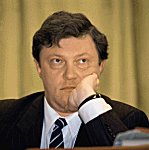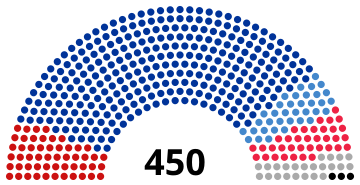
The All-Russian Political Party United Russia is the ruling political party of Russia. As the largest party in the Russian Federation, it holds 325 of the 450 seats in the State Duma as of 2022, having constituted the majority in the chamber since 2007.
The Russian United Democratic Party Yabloko is a social-liberal political party in Russia. The party consequently participated in the elections of deputies of the State Duma of the Federal Assembly of the Russian Federation of all eight convocations. Until 2003, Yabloko was represented by a faction in the State Duma and later until 2007 by individual deputies. In March 2002, the party became a full member of the Liberal International, and since November 1998, it has been in observer status. The founder of the party Grigory Yavlinsky is an honorary vice-president of the Liberal International and winner of its Prize for Freedom. Since 2006, Yabloko has been a member of the Alliance of Liberals and Democrats for Europe (ALDE). As of 2021, the party was represented by factions in 4 regional parliaments of the Russian Federation. In addition, members of the party were deputies of 13 administrative centers of the subjects of the Russian Federation, 183 representatives of the party were municipal deputies in Moscow and 84 in Saint Petersburg.

Presidential elections were held in Russia on 26 March 2000. Incumbent prime minister and acting president Vladimir Putin, who had succeeded Boris Yeltsin after his resignation on 31 December 1999, sought a four-year term in his own right and won in the first round.

Grigory Alekseyevich Yavlinsky is a Russian economist and politician. He has held numerous positions in the Soviet and Russian governments across different levels, including in the State Duma.

The Union of Right Forces (URF) was a Russian liberal-conservative political public organization and former party, initially founded as an electoral bloc in 1999 and associated with free market reforms, privatization, and the legacy of the "young reformers" of the 1990s: Anatoly Chubais, Boris Nemtsov, Sergey Kiriyenko and Yegor Gaidar. The party officially self-dissolved in 2008. Nikita Belykh was the party's last leader from 2005 to 2008.
Within Russian political parties, liberal parties advocate the expansion of political and civil freedoms and mostly oppose Vladimir Putin. In Russia, the term "liberal" can refer to wide range of politicians—simultaneously to Thatcherism/Reaganomics-related pro-capitalism conservative politicians, to centre-right liberal politicians and to left-liberal politicians. The term "liberal democrats" is often used for members of the far-right nationalist Liberal Democratic Party of Russia. There are Russian opposition and pro-government liberal political parties in Russia. Pro-government liberal politicians support Putin's policy in economics.

The State Duma is the lower house of the Federal Assembly of Russia, the upper house being the Federation Council. It was established by the Constitution of the Russian Federation in 1993.

The Federal Assembly is the bicameral national legislature of Russia. The upper house is the Federation Council, and the lower house is the State Duma. The assembly was established by the Constitution of the Russian Federation in 1993, replacing the former Supreme Soviet of Russia. It is located in Moscow.

Nikita Yuryevich Belykh is a Russian politician and former leader of the Union of Rightist Forces party. He was a member of the Legislative Assembly of Perm Krai until 2008, and the governor of Kirov Oblast from January 2009 until his arrest in July 2016.

Gennadiy Nikolayevich Seleznyov was a Russian politician, the Chairman of the State Duma from 1996 to 2003.
Legislative elections were held in Russia on 2 December 2007. At stake were the 450 seats in the 5th State Duma, the lower house of the Federal Assembly. Eleven parties were included in the ballot, including Russia's largest party, United Russia, which was supported by President of Russia Vladimir Putin. Official results showed that United Russia won 64.3% of the votes, the Communist Party of the Russian Federation 11.6%, the Liberal Democratic Party of Russia 8.1%, and Fair Russia won 7.7%, and none of the other parties won enough votes to gain any seats.

Vladimir Aleksandrovich Ryzhkov is a Russian historian and liberal politician, a former co-chair of People's Freedom Party (2006–2014) and former Russian State Duma member (1993–2007), First Deputy Chairman of the State Duma and the leader of parliamentary group Our Home – Russia. He is a candidate of historical sciences, a professor of the Higher School of Economics, and an anchorman of a number of Echo of Moscow radio programs.
The People's Freedom Party, often known by its short form PARNAS, and formerly the Republican Party of Russia – People's Freedom Party, and initially Republican Party of Russia, was a liberal-democratic political party in Russia. It was one of the first opposition parties founded in the final years of the Soviet Union.
Democratic Russia was the generic name for several political entities that played a transformative role in Russia's transition from Communist rule. In 1991–1993, the Democratic Russia Movement was the largest political organization in the country and Boris Yeltsin's base of political support.

Legislative elections were held in Russia on 4 December 2011. At stake were the 450 seats in the 6th State Duma, the lower house of the Federal Assembly. United Russia won the elections with 49.32% of the vote, taking 238 seats or 52.88% of the Duma seats.

The elections for the 5th convocation of the Moscow City Duma took place on 11 October 2009. Out of the 35 deputies, 18 were elected through party lists using proportional representation, while the remaining 17 were elected from single-member constituencies. In order to secure seats in the City Duma through proportional representation, parties needed to surpass a 7% popular vote threshold. The term of office for the newly elected City Duma members is five years, which was extended from the previous four-year term.

The State Duma of the Federal Assembly of the Russian Federation of the 3rd convocation is a former convocation of the legislative branch of the State Duma, lower house of the Russian Parliament, elected on 19 December 1999. The 3rd convocation met at the State Duma building in Moscow from January 18, 2000 to December 29, 2003.

Legislative elections were held in Russia from 17 to 19 September 2021. At stake were 450 seats in the 8th convocation of the State Duma, the lower house of the Federal Assembly. Going into the elections, United Russia was the ruling party after winning the 2016 elections with 343 of the 450 seats, and retaining a supermajority. In March 2020, it was proposed to hold a snap election in September 2020 due to proposed constitutional reforms, but this idea was abandoned. On 18 June 2021, Vladimir Putin signed a decree calling the election for 19 September the same year. Owing to the COVID-19 pandemic in Russia, voting in the election lasted for three days, from 17 to 19 September. Final turnout was reported to be 51.72%.
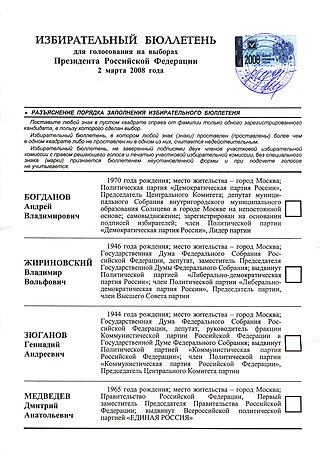
This article contains the list of candidates associated with the 2008 Russian presidential election.

The NTV Affair was a campaign of harassment against and a hostile takeover of the independent NTV television network by Gazprom and the government of Russia, lasting from the May 2000 raid on its offices by the Federal Tax Police Service and its 14 April 2001 buyout by Gazprom-Media, the media arm of Gazprom. The campaign has been widely described as politically motivated, with the intention of cracking down on opposition to Vladimir Putin in Russia and independent media. As a result of the buyout, media freedom in Russia substantially decreased.
![]() 16 | popular_vote6 = 2,610,087 | percentage6 = 4.30% (PL) | swing6 =
16 | popular_vote6 = 2,610,087 | percentage6 = 4.30% (PL) | swing6 = ![]() 1.63%
1.63% | leader7 = Boris Nemtsov | party7 = Union of Right Forces | leader_since7 = 27 May 2001 | leaders_seat7 = Federal list (lost) | last_election7 = 29 seats, 8.52% | seats7 = 3 | seat_change7 =
| leader7 = Boris Nemtsov | party7 = Union of Right Forces | leader_since7 = 27 May 2001 | leaders_seat7 = Federal list (lost) | last_election7 = 29 seats, 8.52% | seats7 = 3 | seat_change7 = ![]() 26 | popular_vote7 = 2,408,535 | percentage7 = 3.97% (PL) | swing7 =
26 | popular_vote7 = 2,408,535 | percentage7 = 3.97% (PL) | swing7 = ![]() 4.55%
4.55% | leader8 = Gennadiy Seleznyov | party8 = PVR–RPZh | leader_since8 = 7 September 2002 | leaders_seat8 = Northern SPB | last_election8 = New | seats8 = 3 | seat_change8 = New | popular_vote8 = 1,140,413 | percentage8 = 1.88% (PL) | swing8 = New
| leader8 = Gennadiy Seleznyov | party8 = PVR–RPZh | leader_since8 = 7 September 2002 | leaders_seat8 = Northern SPB | last_election8 = New | seats8 = 3 | seat_change8 = New | popular_vote8 = 1,140,413 | percentage8 = 1.88% (PL) | swing8 = New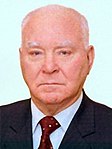 | leader9 = Mikhail Lapshin | party9 = Agrarian Party of Russia | leader_since9 = 26 February 1993 | leaders_seat9 = Federal list (lost) | last_election9 = 11 seats (inside OVR) | seats9 = 2 | seat_change9 =
| leader9 = Mikhail Lapshin | party9 = Agrarian Party of Russia | leader_since9 = 26 February 1993 | leaders_seat9 = Federal list (lost) | last_election9 = 11 seats (inside OVR) | seats9 = 2 | seat_change9 = ![]() 9 | popular_vote9 = 2,205,850 | percentage9 = 3.64% (PL) | swing9 = –
9 | popular_vote9 = 2,205,850 | percentage9 = 3.64% (PL) | swing9 = –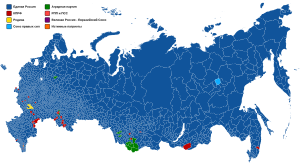 | map_caption = Winning party by district (PR)
| map_caption = Winning party by district (PR)





